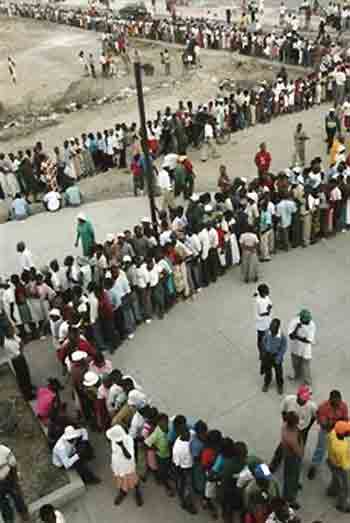|
Scuffles break out as Haitians cast votes
(AP)
Updated: 2006-02-08 08:46 "Voting operations (in the countryside) are normal, with some exceptions,"
said Electoral Council President Max Mathurin.
Most voters waited in lines for hours at polling stations in the capital of
the Western Hemisphere's poorest nation, but some angrily roamed the streets,
fuming at being turned away because of a myriad of problems.
"If these elections are not fair and if the person whom the population wants
doesn't win, houses will burn and heads will be cut off," said Jean Pierre, an
unemployed 33-year-old man who would not give his last name.

Residents of the Cite-Soleil slum line up to
cast their vote in Port-au-Prince, Haiti, Tuesday, Feb. 7, 2006. Haitians
jammed polling stations as U.N. peacekeepers fanned out to guard the
country's first presidential election in nearly six years.
[AP] | The words recalled the battle cry of army Gen. Jean-Jacques Dessalines, who
led a bloody rebellion against French troops and colonists in 1802: "Cut off
their heads and burn their houses."
The stakes are huge — more than simply who will lead the country and who will
occupy seats in parliament. Haiti, which has seen only one president complete
his term in office, could implode if the elections go wrong, experts say.
In the aftermath of a February 2004 rebellion that toppled President
Jean-Bertrand Aristide, gangs have gone on a kidnapping spree and the country's
few factories are closing because of security problems and a lack of foreign
investment.
U.S. officials have warned that a collapse could trigger another wave of
Haitians migrating aboard boats to the United States. That occurred in 1994,
prompting Washington to send troops to Haiti to restore Aristide to power, three
years after he fell to a military coup.
In the northern town of Gros Morne, a Haitian policeman shot and killed a man
in line at a polling station, Wimhurst said. A mob then killed the police
officer, he said. There were two other reported deaths in polling stations in
the capital — two elderly men who collapsed while waiting in line.
Preval — who has the backing of many supporters of Aristide — said if he
wins, Haitians must recognize their country is in dire straits and should not
set their expectations too high.
"We will not be able to do everything right away," he said. "But we are
determined to do our best and raise the standard of living for the people of
Haiti."
Acting U.S. Ambassador Timothy Carney applauded the vote.
"Today was a triumph for the Haitian people," he said. "It was a ragged
start. The Haitian people turned out in force, clearly believing security was in
place. They made it work. They waited in line patiently."
Wimhurst blamed the problems on poor planning and a lack of trained workers.
"Some polling workers didn't show up for work, so we're going to grab people
from the crowd, give them some quick training and get them in there," he said.
Underscoring the difficulty of holding elections in a country with a ruined
infrastructure — including roads — mules transported some election materials to
areas where U.N. helicopters were unable to land. The vote has been postponed
four times since October.
Besides Preval, other top presidential contenders are Charles Henri Baker,
50, whose family runs factories that assembles clothing for export, and Leslie
Manigat, 75, who was president for five months in 1988 until the army ousted
him.
Also running are a former rebel in the insurgency that forced Aristide from
office in February 2004 and a former army officer accused in the death of a
Haitian journalist. If no candidate wins a majority, a March 19 runoff would be
held between the top two candidates.
|